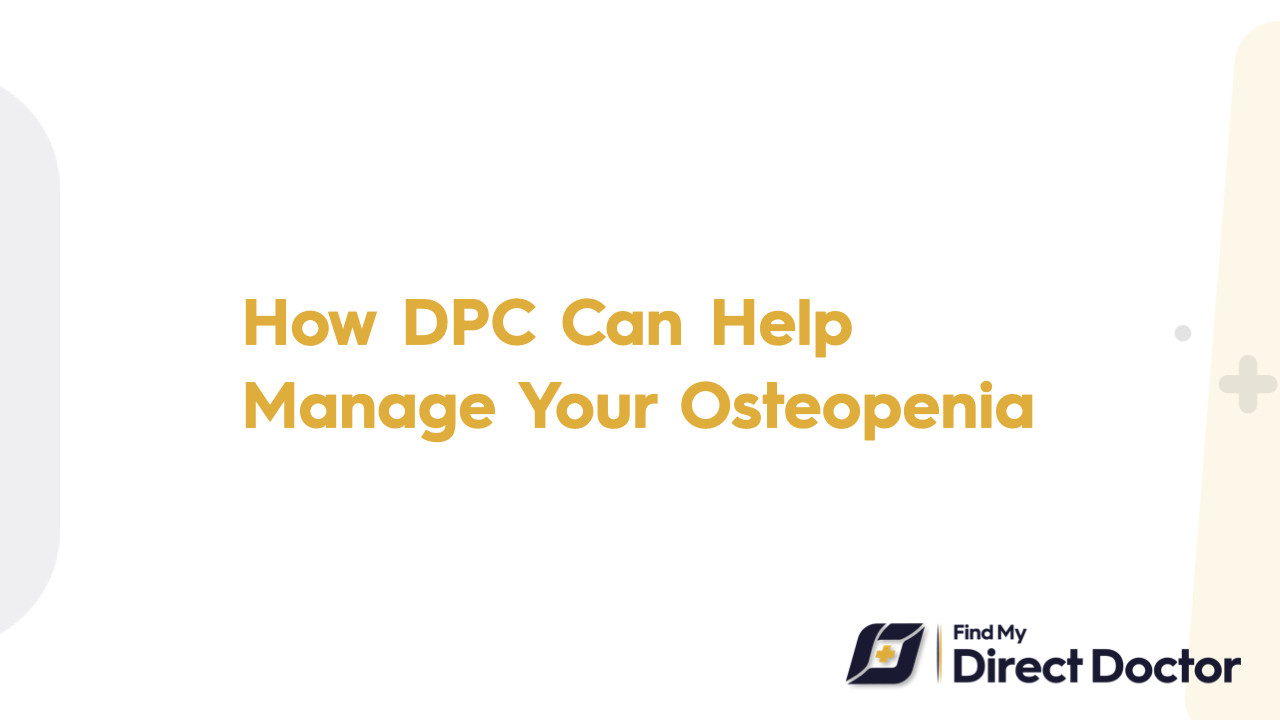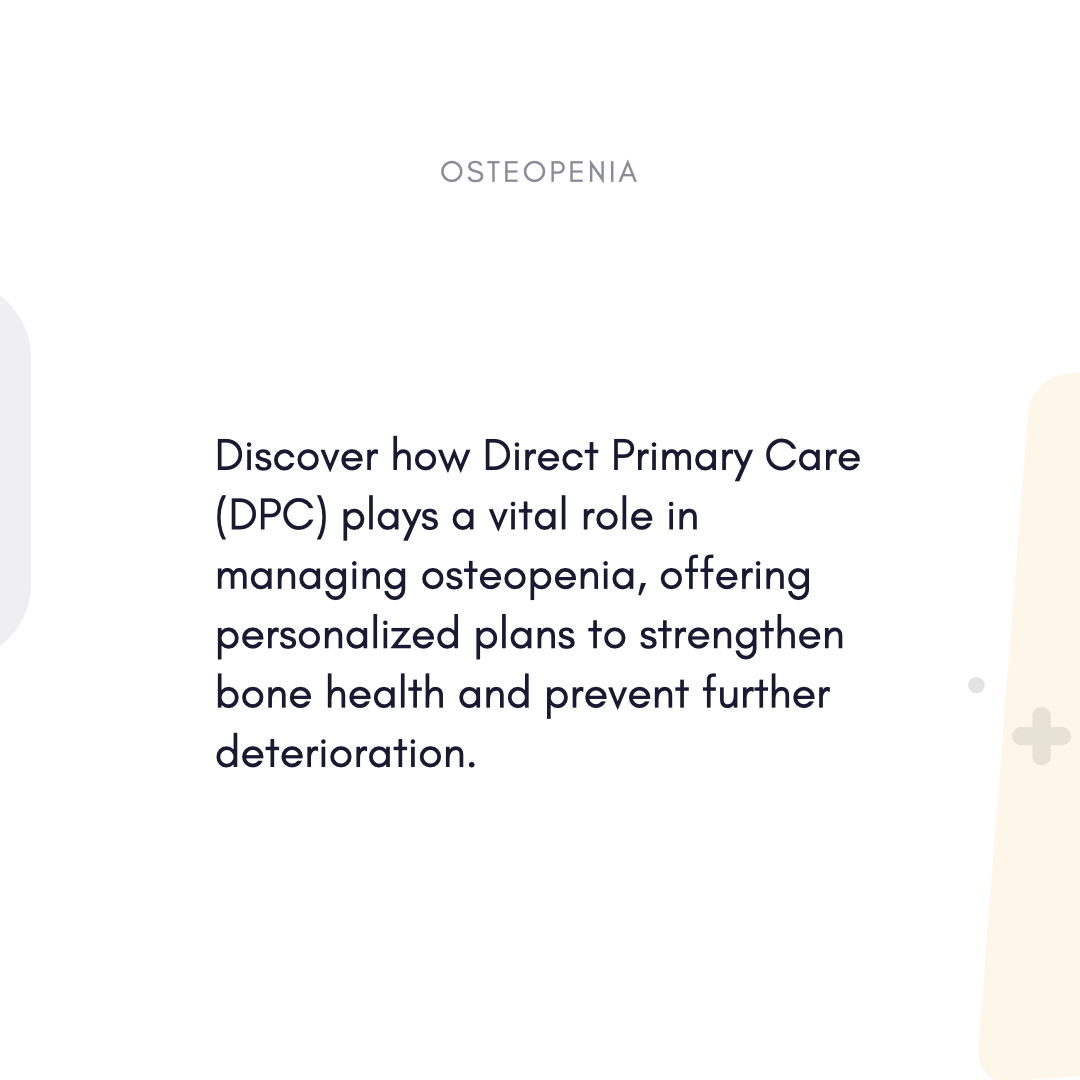Osteopenia and Direct Primary Care (DPC): Proactive Strategies for Stronger Bones
A quiet burglar weakening your bones without notice. The precursor of osteoporosis, osteopenia, affects over 54 million Americans and causes bone density levels to drop below normal. Unchecked, it can cause fractures, persistent pain, and loss of freedom. Many times, traditional treatment offers generic advice or delays tests, leaving patients undersserved and anxious. There is hope, though: Direct Primary Care (DPC) offers a proactive, customized relationship to protect your skeletal integrity.

Understanding Osteopenia
When bone mineral density (BMD) falls, osteopenia results, raising fracture risk. Common triggers are aging, hormonal changes (such as menopause), and lifestyle choices including inadequate diet or inactive behavior. Though subtle, symptoms are important and should be addressed.
- Not clearly symptomatic until a fracture takes place.
- Over time, height loss or stooped posture
- Risk factors include: Family history, poor calcium or vitamin D intake, smoking, or extended steroid use
Long-term dangers of uncontrolled osteopenia:
- Advancement to osteoporosis
- Broken hips, spine, wrist; fragility fractures
- Limitations in mobility and persistent pain
Early intervention is stressed by the Bone Health and Osteoporosis Foundation (BHOF) to stop bone loss and avoid crippling complications.
DPC Transforms: Osteopenia Control
Operating on a membership model usually 50–150 USD/month, Direct Primary Care (DPC) provides unlimited consultations, same-day visits, and clear pricing. For those with osteopenia, this means no surprise bills, no hurried visits, and a strategy catered to your bones.
1. Early Intervention and Prevention Screening
DPC gives prevention top importance using:
- Affordable DEXA scans followed over time for regular BMD scans.
- FRAX Risk Assessments: Reviewing your 10-year fracture risk will direct treatment.
- Testing nutrients: looking at magnesium, calcium, and vitamin D levels to correct deficits.
2. Individualized, Evidence-Based Treatment
Using BHOF guidelines, DPC doctors create customized plans including:
- If dietary intake falls short, supplements high in calcium or vitamin D.
- Medication when needed: for high-risk patients, bisphosphonates—such as alendronate—have great effect.
- Plans for weight-bearing exercise (such as walking or resistance training), help with smoking cessation, and alcohol moderation techniques constitute a lifestyle redesign.
- Your doctor addresses not only labs but also sleep, stress, and barriers to staying active—key factors in bone health—during 30 to 60 minute visits.
3. Cost-Effective, Open Treatment
- DPC cuts costs by means of wholesale-priced labs and scans (such as DEXA at 40% less than insurance rates).
- Preventive emphasis to stop expensive ER trips or fractures.
- All included in your membership, there are no hidden fees for follow-up or nutritional counseling.
Personal Success Stories from Real Life
- Case 1: Though Karen, 58, had borderline osteopenia, she worried about side effects from her medications. Her DPC doctor developed a plan including daily strength training, vitamin D3 optimization, and a Mediterranean diet heavy in leafy greens. Her DEXA scan following showed stable BMD—no drugs required.
- Case 2: Tom, 65, avoided treatment because of cost; he used to smoke and has spinal osteopenia. His DPC clinic connected him with a physical therapist, discounted bone scans, and wrote a meal plan heavy in calcium. Now he gardens pain-free and has no fractures.
Ask Questions About Osteopenia and DPC.
- If osteopenia advances to osteoporosis, can DPC manage it?
- A: Definitely. DPC doctors guarantee continuity of treatment, modify meds, and work with endocrinologists.
- Q: For chronic diseases like OA, is DPC reasonably priced?
- A: Of course. Avoiding co-pays, imaging mark-ups, and urgent care visits for minor injuries, members save 1,000+ USD yearly.
- Q: What would happen if I wanted natural solutions?
- A: DPC respects your choices and provides alternatives including dietary changes, yoga for balance, or bioidentical hormone treatment (if indicated).
Why DPC Is a Win for Osteopenia Patients: Why
The American College of Physicians supports DPC's patient-centered approach, which conforms to BHOF guidelines by:
- Precision Prevention: Customizing treatments for your particular risk profile.
- Quick lab reviews allow you to change medications or supplements.
- Empowerment: Food diaries or exercise logs are among the tools for monitoring improvement.
Create Stronger Bones Starting Right Now.
One-way paths to frailty are not necessary for osteopenia. DPC helps you to find a partner who listens, thinks creatively, and prepares you to preserve your bones—for life.






